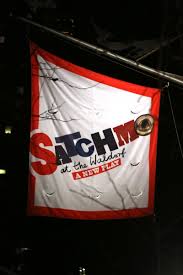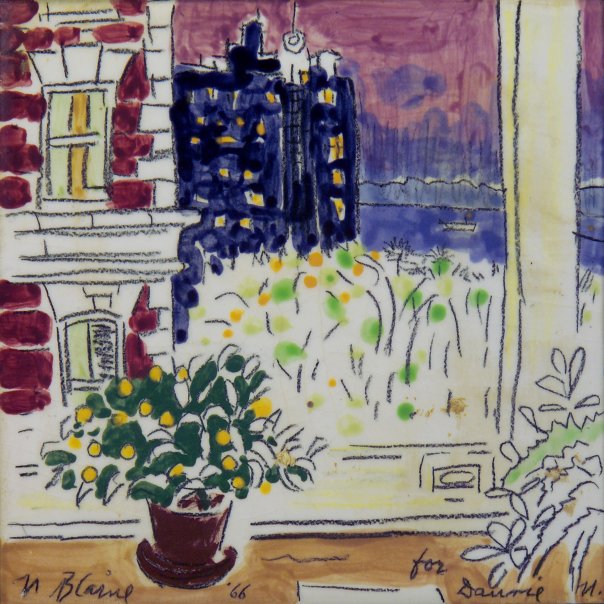The Beaux Arts Trio plays the first movement of Ravel’s A Minor Trio:
(This is the latest in a series of arts-related videos that appear in this space each Monday and Wednesday.)
Archives for March 2014
Almanac: William James on the meaning of life
“It is only by risking our persons from one hour to another that we live at all. And often enough our faith beforehand in an uncertified result is the only thing that makes the result come true.”
William James, “Is Life Worth Living?”
Lookback: on parody
From 2004:
I love parody and caricature, and it’s one of my medium-sized regrets that I have no gift for either (though I can do adequate impersonations of a few of my friends). Alas, I find it impossible to get inside another person’s prose style. I once tried to write a parody of a Jeeves novel in the style of Bright Lights, Big City. That was actually a pretty good idea, conceptually speaking, but I stalled out halfway through the fourth sentence, so it went unwritten, and the only thing I can remember about it now is that the very first word was, of course, “you.”
Read the whole thing here.
Almanac: Dorothea Lang on cameras
“The camera is an instrument that teaches people how to see without a camera.”
Dorothea Lange, Dorothea Lange: A Photographer’s Life
The rest of me
 The off-Broadway transfer of Satchmo at the Waldorf has now been running at the Westside Theatre for just shy of a month–two weeks of previews, two weeks of regular performances–and while I remain amazed that it got there in the first place, I also find myself growing more accustomed to its continuing presence.
The off-Broadway transfer of Satchmo at the Waldorf has now been running at the Westside Theatre for just shy of a month–two weeks of previews, two weeks of regular performances–and while I remain amazed that it got there in the first place, I also find myself growing more accustomed to its continuing presence.
Whereas I used to come to the theater nearly every night, I no longer drop in on performances save to welcome a friend who’s there to see Satchmo. When I do, I usually watch the show from beginning to end, then go backstage to visit John Douglas Thompson in his dressing room. Most of the time, though, I prefer to stay at home with Mrs. T and read the nightly performance reports from Linda Marvel, our omniscient stage manager.
None of this means that I take Satchmo for granted. It continues to be a great adventure and a source of intense personal pride. But I’m emotionally and physically drained from the stress of getting it open in New York, in part because I wasn’t able to take any time off from my day job at The Wall Street Journal to do so, or to rest up after opening night. March and April are the busiest of months for a New York drama critic, and I have a couple of dozen shows to see and review on and off Broadway, as well as a trio of consecutive out-of-town speaking engagements that will soon take me to Tucson, New Haven, and Baltimore.
 For all these reasons, the actual opening night of Satchmo barely seems real to me now. It happened, I was there, and now…the moment’s over. To be sure, I can’t claim anything remotely approaching the detachment of Paul Hindemith, who once told the mezzo-soprano Jennie Tourel something that I find all but impossible to fathom:
For all these reasons, the actual opening night of Satchmo barely seems real to me now. It happened, I was there, and now…the moment’s over. To be sure, I can’t claim anything remotely approaching the detachment of Paul Hindemith, who once told the mezzo-soprano Jennie Tourel something that I find all but impossible to fathom:
Hindemith, after he wrote a piece, wasn’t interested in it anymore. He never came to hear my Marienleben; although he knew I do it very well, he said he’s not interested to hear it–he’s written it.
Not me. I still find it fascinating to watch John perform Satchmo. If any other actors should appear in the play in the future, I’ll be just as eager to see them do it, and (if possible) to help them rehearse it. But the huge psychic space that Satchmo has occupied in my mind for the past couple of years is finally starting to shrink, like a thirsty tumor responding to chemotherapy.
I discovered last week, for instance, that I was hungry to hear classical music again after a long hiatus. Among other things, I’ve listened to Aaron Copland’s Violin Sonata, Schubert’s Octet, the Brahms Fourth Symphony and Liebeslieder Walzer, Bernard Herrmann’s Souvenirs de Voyage, Beethoven’s last string quartet, and Haydn’s last piano sonata. I’ve also read a stack of books about music, including Bernard Shore’s The Orchestra Speaks and biographies of Arturo Toscanini, Otto Klemperer, and Herbert von Karajan. In addition, I chewed my way through the four volumes of Robert Caro’s Lyndon Johnson biography (a byproduct, no doubt, of my having seen and reviewed All the Way). Now I’m reading Mark Harris’ Five Came Back: A Story of Hollywood and the Second World War, an excellent book about which I’ll be writing an essay for Commentary next week.
 I’m also spending more time looking at the art on the walls of our Hudson Heights apartment, which in recent weeks I’d been taking more or less for granted–an admission that I blush to make. It’s little short of sinful to look at the work of artists like Milton Avery, Nell Blaine, Richard Diebenkorn, and Fairfield Porter without seeing it, especially when you’re privileged to live with their creations from day to day. Yet that’s exactly what I was doing, and I’m relieved to say that I’m not doing it anymore.
I’m also spending more time looking at the art on the walls of our Hudson Heights apartment, which in recent weeks I’d been taking more or less for granted–an admission that I blush to make. It’s little short of sinful to look at the work of artists like Milton Avery, Nell Blaine, Richard Diebenkorn, and Fairfield Porter without seeing it, especially when you’re privileged to live with their creations from day to day. Yet that’s exactly what I was doing, and I’m relieved to say that I’m not doing it anymore.
I am, in short, becoming myself again–or, rather, my selves. The newest of those selves is a playwright, one whose first play has just been produced in New York. The others, however, are at least as important to me, and it’s nice to have them back again. Even as a boy, I had a restless mind, though I long ago acquired the iron discipline without which it’s impossible to keep more than one professional ball in the air simultaneously. When I’m doing something, no matter what it may be, I live by the words of the preacher: Whatsoever thy hand findeth to do, do it with thy might; for there is no work, nor device, nor knowledge, nor wisdom, in the grave, whither thou goest. But once it’s done, I do something else.
Beyond hitting my usual Journal and Commentary deadlines, I’m not yet sure what that something else will be. I have three unfinished scripts that are crying out to be revised, as well as an idea for a biography that excites me. At the same time, the thought has also occurred to me that I might do better to lay fallow for a couple of months, then take Rudyard Kipling’s oft-quoted advice: “When your Daemon is in charge, do not try to think consciously. Drift, wait, and obey.”
For the moment, though, my Daemon, if I have one, isn’t sending any signals. Nor am I listening for them too closely. There is a time to be reborn, and a time to sleep late.
Just because: Aaron Copland conducts his Third Symphony
Leonard Bernstein talks about American music at a 1958 Young People’s Concert by the New York Philharmonic, then introduces Aaron Copland, who conducts the finale from his Third Symphony:
(This is the latest in a series of arts-related videos that appear in this space each Monday and Wednesday.)
Almanac: Herbert von Karajan on photography
“A photograph is a quotation taken out of context.”
Herbert von Karajan (quoted in Richard Osborne, Herbert von Karajan: A Life in Music)
OUTING NORMAN ROCKWELL
“What kind of artist was Norman Rockwell? Not until his later years does anyone seem to have asked that question other than in passing. It was taken for granted, even by Rockwell, that he was an illustrator–a painter whose canvases were commissioned by magazine editors and advertising agencies for purely commercial purposes…”
